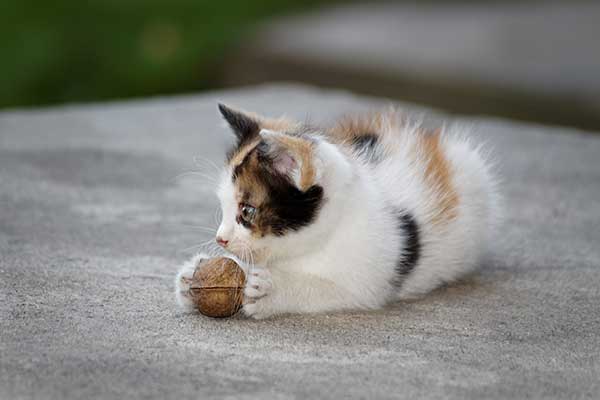Walnuts have always been classified among superfoods. That makes them a welcome addition to our diets.
The nuts come with a cocktail of health and nutritional benefits for humans, and they are some of the foods that nutritionists would recommend any day.
However, can the same be said about our feline friends? Can cats eat walnuts?
The answer to that question is a bit technical. While walnuts will not cause any severe side effects to your feline friend, you’re better off not giving these nuts to your cat in the first place.
That’s primarily because the digestive system of cats isn’t designed to handle plant matter. As such, walnuts might still wreak havoc on your cat’s gastrointestinal system.
If you’re a loving and responsible cat owner, you’ll occasionally find yourself wondering, “my cat ate walnuts, what do I do?’’
Read on as we unpack the topic of walnuts and cats by highlighting the possible benefits and risks of walnuts, as well as best ways to serve these nuts to your kitto.
Table of Contents
Can Cats Have Walnuts And If Yes, What Are The Benefits?
Are walnuts okay for cats?
We’ve already mentioned that giving walnuts to cats isn’t a great idea. However, there are instances when you might consider offering the nuts to your kitto as a snack.
In such cases, your primary concern would be the possible health and dietary benefits your cat will enjoy from eating walnuts.
Let’s highlight some of the popular benefits of walnuts.
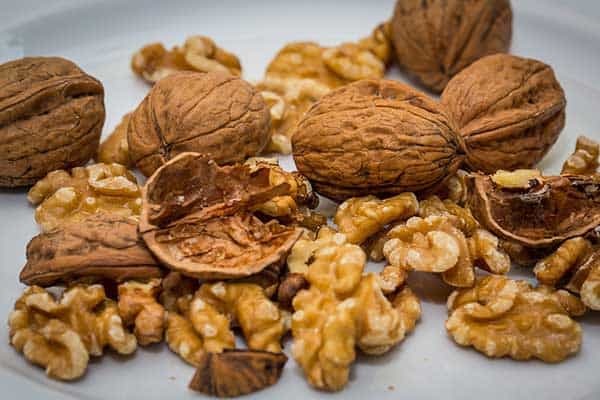
1. Support Brain Function
Walnuts are rich in compounds such as polyunsaturated fat, Vitamin E, and polyphenols, which might support the health and performance of your cat’s brain.
These compounds reduce oxidative stress, while also inhibiting the activities of the inflammatory agents in your cat’s brain. As such, they may help to prevent brain damage, as well as boost the cat’s memory and reduce anxiety.
2. Prevent Premature Aging
Like humans, cats can also experience symptoms of premature aging. But an occasional treat of walnuts might make all the difference.
The nuts contain minerals that enhance motor functions and lower the early onset of aging signs.
3. Prevent Heart Disease
There are numerous compounds in walnuts that make the nuts excellent at maintaining a healthy heart.
Most notably, walnuts are loaded with alpha-linolenic acid (ALA), which have been shown to lower the risks of dying from heart diseases.
- EASY TO USE, IMPACTFUL RESULTS: Collect a sample, package it up, and send it securely back. Just register, swab, return with the...
- MOST COMPREHENSIVE BREED & TRAIT: Our test distinguishes over 20+ distinct breeds and 50+ trait markers with the most...
- SCREEN FOR 40+ GENETIC DISEASES: Get peace of mind by screening for 64 health markers associated with 43 diseases for which your...
Last update on 2025-03-27 / Affiliate links / Images from Amazon Product Advertising API
4. Boost Your Cat’s Immunity
Walnuts boast the highest amount of antioxidants compared to any other nut. Examples of the antioxidants include melatonin, polyphenols, and Vitamin E.
Collectively, these antioxidants prevent the oxidative damage to the body cells caused by “bad” LDL cholesterol. These effects are invaluable for cats that are suffering from heart and cardiovascular diseases.
Overall, the antioxidants in walnuts might help to keep various diseases at bay, especially inflammatory conditions like cancer.
The following are other potential benefits of walnuts for cats;
- Contain ellagitannins, which is a subgroup of polyphenols that protects your cat from type 2 diabetes,
- Are loaded with fiber that promote a healthy gut, and
- Have appetite-suppressing properties that might help with obese and overweight cats.
Evidently, there are plenty of ways your cat can benefit from snacking on walnuts. But the questions remain, are walnuts safe for cats or are walnuts dangerous for cats?
The next sections shall offer more insights on the safety of walnuts for cats.
Are Walnuts Toxic To Cats? Here’s What Could Go Wrong
One of the frequently raised concerns among many cat owners is, my cat ate a piece of walnut and I’m worried about what could happen to it.
Well, it’s only natural to express your fears when it comes to walnuts and cats. But are walnuts harmful to cats?
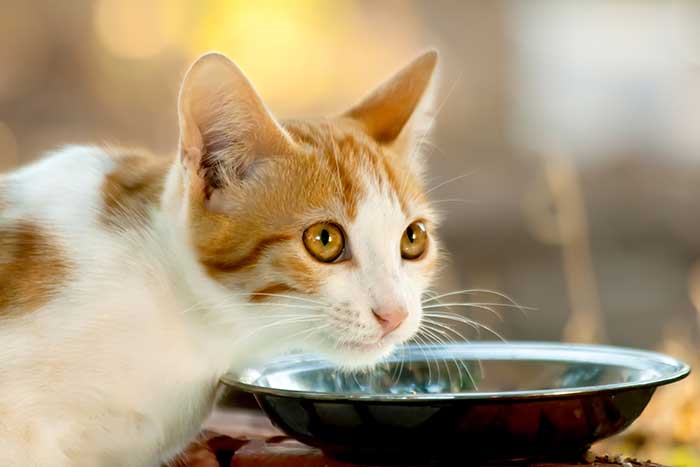
And now, you may be wondering, what happens if a cat eats a walnut?
First off, it’s important to remember that cats are obligate carnivores. As such, they can survive exclusively on a diet of animal protein.
As obligate carnivores, the digestive system of cats considers plant-based matter, such as walnuts, as foreign substances. Therefore, eating walnuts can lead to stomach irritation, which manifests in vomiting, diarrhea, or abdominal pain.
Secondly, walnuts, as is the case with most nuts, are high in fats and oils. Ingesting large amounts of fats can also irritate your cat’s stomach, leading to vomiting and diarrhea. And that might get you wondering, is walnut oil safe for cats?
The answer is a resounding no. Besides causing stomach irritation, walnut fats and oils could also lead to pancreatitis in cats.
Pancreatitis refers to the inflammation of the pancreas. It occurs when the pancreas secrets digestive juices but doesn’t release those juices to the cat’s digestive system. Instead, the juices turn on the organ and digest its tissues.
Examples of pancreatitis symptoms include diarrhea, vomiting, and abdominal discomfort.
Another possible side effect of walnuts for cats comes from the nuts’ high sodium content. Cats shouldn’t eat foods that are high in salt, as that might lead to sodium ion poisoning.
Symptoms of sodium poisoning in cats range from stomach upset to seizures, tremors, multiple organ failure and ultimately, death. So, can walnuts kill cats?
Your cat may not die immediately after eating walnuts. However, the cat could develop severe side effects that might eventually cause death if not treated with the urgency it deserves.
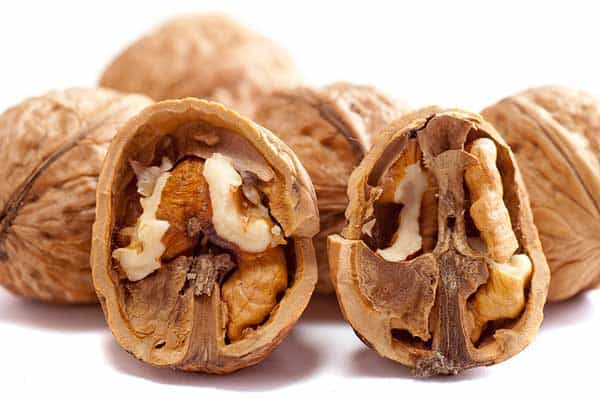
Are Walnuts Bad for Cats?
So far, we’ve highlighted the potential benefits as well as risks of offering walnuts to your feline friend. But you might still be wondering, should I give my cat walnuts?
Well, the answer remains – not recommended.
If you can, avoid feeding your cat walnuts in any form. And that begs the question, can cats eat black walnuts?
Black walnuts have been shown to cause toxicity in dogs and horses. But what about cats, is black walnut safe for cats?
While they’re not immediately toxic to cats, there are still some side effects that black walnuts may cause to cats.
The following are other related questions pertaining to walnuts and cats.
Can cats have walnut butter?
Walnut butter is discouraged for cats for two reasons – high fat and high salt content.
Can cats have walnut milk?
Walnut milk is not recommended for cats for the same reasons walnuts are discouraged. Also, the milk might contain other ingredients that are toxic for cats.
Can cats eat walnut cake?
Walnut cake is usually flavored with sugar and other artificial sweeteners, which makes it a bad idea for cats.
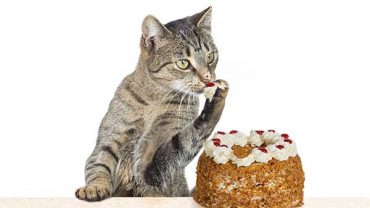
Are walnut shells bad for cats?
Yes, walnut shells are tough for cats to chew. Therefore, they present risks of choking. And that also leads to another question, is walnut litter safe for cats?
Since walnut litter is mostly made of walnut shells, its safety depends on that of the shells. And as we’ve just mentioned, walnut shells are harmful for cats, which makes walnut litter equally unsafe.
So, Are Walnuts Good For Cats?
Walnuts are not immediately toxic to cats if offered in moderation. However, there appears to be more potential risks than there are benefits. So, your best bet is to avoid feeding your kitto walnuts altogether.
Checkout Our Favorite Cat Products
1. Best Online Course For Cat Parents
Our favorite: The Cat Language Bible (How to Finally Undrestand And Speak to Your Cat) – A new form of cat to human communication that many cat owners have dreamed about… but few have actually thought possible.
2. Best Vacuum to Tackle Pet Hair
Our favorite: Dyson Ball Animal 2 – Engineered for homes with pets. With features and tools that dig out dirt, hair and allergens everywhere your pet gets.
3. Best Immune Support For Cats
Our favorite: Tomlyn Immune Support – Best Supplement for Cats and Kittens.

